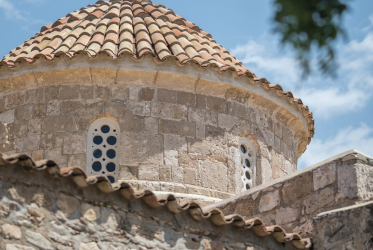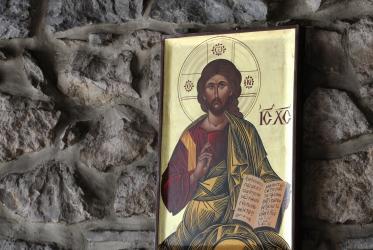Document
Orthodox Women Facing the Challenges and Ambivalences of the Post-Modern Societies: Looking for a Theology of Healing
Tirana, Albania, 8-12 July 2010
- Praise to God! Father, Son and Holy Spirit for the special blessing to meet, discuss and respond as Orthodox women and men, and sisters and brothers from Roman Catholic, Anglican, Protestant and Pentecostal churches on the critical issue of wounded-ness and healing. This encounter inspired and sponsored by the World Council of Churches, Women in Church and Society brought together twenty-three participants from Africa, Asia, Europe, Middle East, North and South America.
- We, the participants express our deep gratitude to His Beatitude Anastasios, Archbishop of Tirana, Durres and all Albania for generously hosting the meeting in Albania at St Vlash Theological Academy and for his inspirational words on the wounded-ness and the holistic healing in reviving the faith and hope of the members of the Autocephalous Orthodox Church of Albania. This shared experience and life of the Orthodox Church of Albania in the last nineteen years offered an essential context for other deep reflections during the gathering.
- Our conversation on Orthodox Women Facing the Challenges and Ambivalences of the Post-Modern Societies: Looking for a Theology of Healing was a follow up of previous consultations with Orthodox women on the role of women in the church (Agapia 1976; Rhodes 1988; Crete 1990; Damascus 1996; Istanbul 1997; Volos 2008). However, our gathering was enriched not only by the presence of Orthodox men but also of other men and women from Christian traditions exploring the healing offered as a common gift of the Incarnate, Crucified and Resurrected Savior who redeems the corrupt and mortal human nature. This healing is expressed in a concrete way daily according to the needs of the social context in which the Christian communities struggle.
- In this new era of human history we face new opportunities, but also immense challenges that can either unite us more closely as a human family or create walls, divisions and wounds which separate us from God and each other and alienate us from those in need.
- In this context we reaffirm and commit ourselves to be agents of the resurrected Lord and instruments of healing in a broken and needy world. Healing is a gift from the incarnate, crucified and risen Lord to all creation. The wounds of women are due to human arrogance and weakness to overcome the social and institutional structures which negatively affect their relationships and diminish their God given dignity.
- In this perspective the leadership of the women in the life of the church (e.g. worship, administration, catechism, philanthropy and social care) is not understood as seeking power and prestige but as a deeper commitment to love and service that responds to the sacrificing love of Christ. This offering of women can be addressed as a healing to all suffering people, particularly the abused, the violated, the victims of poverty and other marginalized people among which women and children are the most vulnerable and highest numbers.
- For example, the painful way of the undocumented migrants from Mexico crossing the hot desert of Arizona; the struggle and nightmare of the Palestinians to survive and keep their dignity and land; the oppression experienced by the aboriginal women in Taiwan; the challenges faced by all Christians in Malaysia. These are some of the open wounds in need of healing.
- When we gather as a community in the Liturgy, we have the possibility of receiving what the early church called “medicine for life.” The Christian communities are called to continue this liturgy, giving witness to the unity of men and women in common action for healing, promoting justice, peace, mutual understanding, and tolerance and above all love according to the needs of the wounded people in each context.
- The answer to this call presupposes metanoia/repentance which means a complete turnabout of the whole person from patterns of egotism, indifference and injustice to concrete actions of compassion, solidarity and justice.
The Way Forward
We invite the WCC to encourage meetings that bring together Orthodox women and men with Christians from other traditions so that
- We may learn from diverse theological traditions
- We may interact with different cultural and social contexts and the social sciences
- We may deepen our understanding of today’s global world (late modern or post-modern) and contribute towards building a conscientious community of women and men
- We may strengthen our common witness of Christ our Healer to the wounded humanity and nature.
- We may speak out against violence to women as a part of the process forward and better prepare for the International Ecumenical Peace Convocation scheduled in Jamaica (2011), and beyond to the 10th WCC Assembly in Korea (2013).




